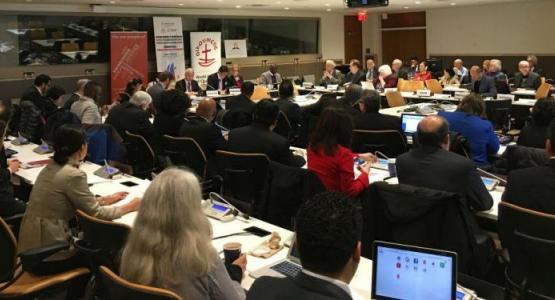
Adventists Help Drive UN Discussion About Religious Extremism
A symposium discusses violence carried out under the banner of faith.
Story by Bettina Krause / Originally published on adventistreview.com / Image courtesy PARL
The Seventh-day Adventist Church is co-leading a discussion about religious extremism at the United Nations, with a church representative telling a major symposium that violent extremism is not fueled by religion itself but a corrupted understanding of religion.
Ganoune Diop, director of public affairs and religious liberty for the Adventist world church, made his remarks during a keynote speech to 130 representatives from various UN agencies, along with religious and non-governmental organizations, at the second annual symposium on the role of religion and faith-based groups in international affairs. The event was co-sponsored by the Adventist Church.
Diop challenged the “simplistic generalization” that religion and religious faith should bear the blame for driving extremist violence. Drawing on history and theology, he traced a connection between people’s understanding of God and how they relate to other human beings.
Violence finds fertile ground in “any religion or ideology that instrumentalizes human beings, that fails to recognize the sacredness of human life and the innate dignity of every person, or that refuses to acknowledge the freedom of others,” Diop told the symposium at the United Nations Secretariat in New York earlier this month.
Diop said that extremist violence is also bolstered by a theological perspective that prioritizes ideas or objects above respect and care for others.
“Human beings are more important than objects or places,” he said. “Humans beings are more important than cathedrals, churches, mosques, or shrines.”
Other presenters at the symposium included Adama Dieng, the UN secretary-general’s special advisor for the prevention of genocide; Zainab Hawa Bangura, special representative of the UN secretary-general on sexual violence in conflict; and John Esposito, professor of religion and international affairs at Georgetown University. The public affairs and religious liberty department of the Adventist world church was one of three organizers of the symposium, which was also co-sponsored by the UN Inter-Agency Taskforce for Engagement with Faith-based Organizations.
Diop said in an interview that Adventists have significant practical and theological contributions to make in the public discussion about how to discourage religiously motivated violence, especially promoting human dignity. He cited as an example the Adventist Church’s belief in the biblical doctrine of creation, which embraces the teaching that every person has been made in the image of God.
“This gives us a unique understanding of the oneness of the human family,” he said.
Diop also pointed to the Adventist Church’s “international portfolio of services,” which includes educational, spiritual, health, and humanitarian care. All these institutions and services, he said, speak to Adventism’s efforts to improve people’s lives and to affirm the value of every human being.

Add new comment